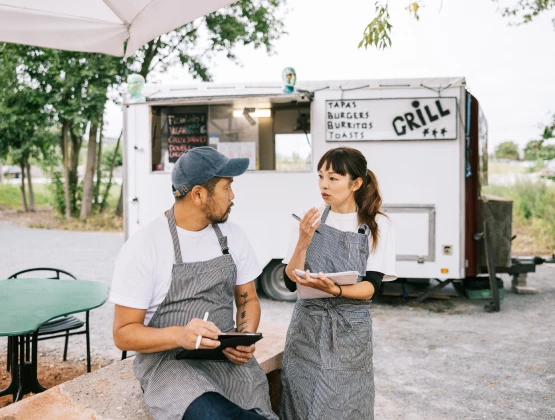Mobile Vendor Insurance in Ontario
Protect Your Business on the Go
Operating a mobile vendor business offers the flexibility to reach customers in multiple locations, but it also presents unique risks. If you sell food from a truck, run a pop-up shop, or offer merchandise at events, mobile vendor insurance provides vital protection against potential financial liabilities. With the right insurance, you can focus on growing your business while being protected from risks like customer injuries, equipment breakdown, and property damage. Best Buy Insurance is here to help you secure the coverage you need, so you can run your business with confidence.
What is Mobile Vendor Insurance?
Mobile vendor insurance is a comprehensive policy designed for businesses operating in various locations. This type of insurance typically includes Commercial General Liability (CGL), Commercial Property Insurance, and Product Liability Insurance, along with additional coverage options to address the unique challenges faced by mobile vendors. For example, Non-Owned Auto Insurance and Business Interruption Insurance provide added protection when unexpected events occur, ensuring you can keep your business running smoothly. Mobile vendor insurance is essential for food trucks, market vendors, pop-up shops, and other businesses that operate on the go.
Key Coverages for Mobile Vendors
- Commercial General Liability (CGL) Insurance:
CGL insurance is fundamental for mobile vendors, as it covers claims related to third-party injuries or property damage. For instance, if a customer slips near your vendor setup or if someone’s property is accidentally damaged by your equipment, CGL insurance will cover legal fees, medical expenses, and settlements. This coverage is vital for vendors who operate in public areas where accidents can easily happen, providing protection for a wide range of potential claims. - Commercial Property Insurance:
Your business assets, such as equipment and inventory, need to be protected against risks like fire, theft, and vandalism. Commercial property insurance offers coverage for these assets, ensuring you can recover from damage without significant financial loss. This coverage is particularly important for mobile food vendors who use equipment like grills, fryers, or display stands. Property insurance helps cover repair or replacement costs if these assets are damaged during transit or storage. - Product Liability Insurance:
For vendors selling food, beverages, or other consumable products, product liability insurance is essential. This coverage protects you if a customer claims they suffered harm due to a product you sold, such as an allergic reaction. Product liability insurance helps cover legal fees and damages, ensuring your business isn’t financially compromised by a single claim. This coverage is particularly valuable for mobile food vendors and pop-up shops selling products directly to consumers. - Non-Owned Auto Insurance:
If you frequently rent or lease vehicles to transport your products or equipment, non-owned auto insurance provides protection in case of an accident involving a rented vehicle. For example, if you rent a van to transport merchandise to an event and an employee is involved in a collision, this coverage helps cover damages and liability costs. Non-owned auto insurance is essential for businesses that rely on rental vehicles or use personal vehicles for business activities. - Equipment Breakdown Insurance:
Equipment breakdown insurance is crucial for vendors who rely on specific equipment to operate. This coverage helps cover the cost of repairing or replacing essential equipment if it breaks down due to mechanical issues. For example, a mobile food vendor with a generator or refrigeration unit can benefit from equipment breakdown insurance, as it helps avoid costly downtime due to equipment failure. - Business Interruption Insurance:
If an unexpected event forces you to temporarily halt operations, such as a fire damaging your setup, business interruption insurance can help cover the loss of income during the downtime. This allows you to maintain cash flow and continue paying necessary expenses while you work to restore your business. For mobile vendors, this coverage is invaluable in ensuring financial stability during periods of disruption.
Why Mobile Vendors Need Insurance
Mobile vendors face unique risks that stationary businesses may not encounter. By operating in public spaces and moving between locations, you’re exposed to potential accidents, property damage, and equipment breakdowns that can lead to financial losses. Insurance provides a financial safety net, enabling you to recover from these incidents without jeopardizing your business.
Additionally, many event organizers and venues require mobile vendors to have proof of insurance before they’re allowed to operate on their premises. By carrying comprehensive coverage, you demonstrate professionalism and build trust with clients, event organizers, and customers. Insurance also provides peace of mind, allowing you to focus on providing excellent products and services rather than worrying about potential liabilities.

Cost of Mobile Vendor Insurance
The cost of mobile vendor insurance depends on several factors, including the type of business, coverage limits, and specific risks associated with your operations. Small mobile food vendors or single-person market vendors might expect to pay between $500 and $1,000 annually for basic liability and property coverage. However, businesses with more extensive equipment or higher liability risks may require additional coverages, like business interruption or non-owned auto insurance, which can increase premiums. Consulting with an experienced insurance broker can help you find tailored policies that meet your budget and coverage needs.
Steps to Buy Mobile Vendor Insurance
- Identify Your Coverage Needs:
Consider the specific risks your business faces, including potential customer injuries, equipment needs, and product liability. For instance, food vendors should ensure they have product liability coverage in case of customer illness. - Consult with a Broker:
An insurance broker, such as Best Buy Insurance, can help you navigate the various coverage options and select policies that best meet your needs. Our team specializes in mobile vendor insurance, ensuring you get the most comprehensive and affordable coverage for your business. - Select Appropriate Coverage Limits:
Based on the value of your assets and the level of risk involved, choose coverage limits that provide adequate protection. Higher limits offer more security but will increase the cost of your premium. It’s important to strike a balance between affordability and thorough coverage. - Review Your Policy Annually:
As your business grows, your insurance needs may change. Review your policy with your broker each year to ensure it remains relevant. Regularly updating your coverage ensures that you’re fully protected as your business expands or takes on new risks.
Why Choose Best Buy Insurance
- Best Buy Insurance understands the challenges faced by mobile vendors and offers specialized insurance solutions to protect your business.
- We can help you find the right coverage to ensure you’re protected from a variety of risks.
- Our team will help you customize an insurance package that meets your needs and allows you to focus on growing your business.

Get a Quote
Contact Best Buy Insurance today for a customized quote and let us help you secure the coverage you need to operate with confidence.
Mobile Vendor Insurance FAQs
Mobile Vendor Insurance provides coverage for food trucks, retail vendors, and other mobile businesses, protecting against liability, property damage, and accidents on the go.
It’s essential for food truck operators, mobile retail businesses, and service vendors to protect their equipment, inventory, and liability.
Yes, many policies cover physical damage to the mobile vehicle, along with equipment and inventory inside.
